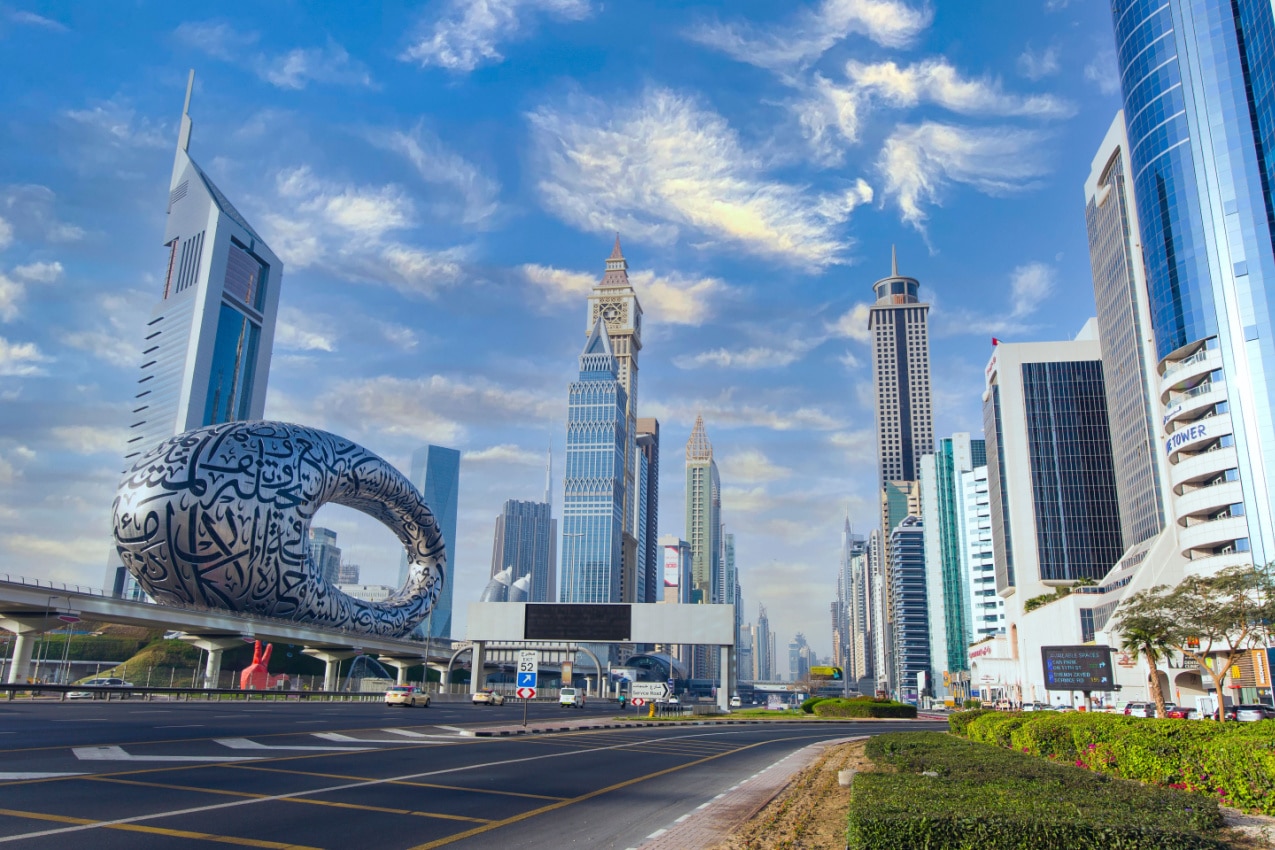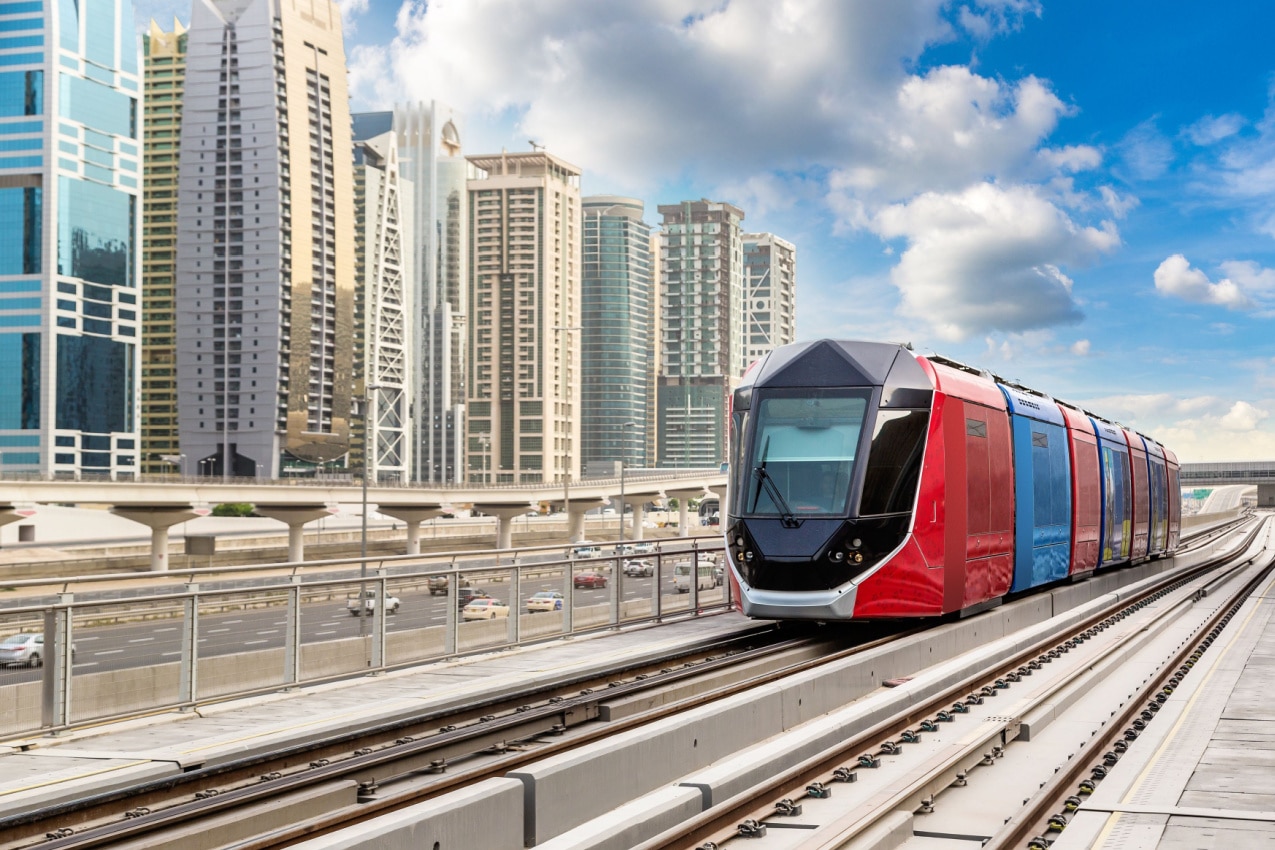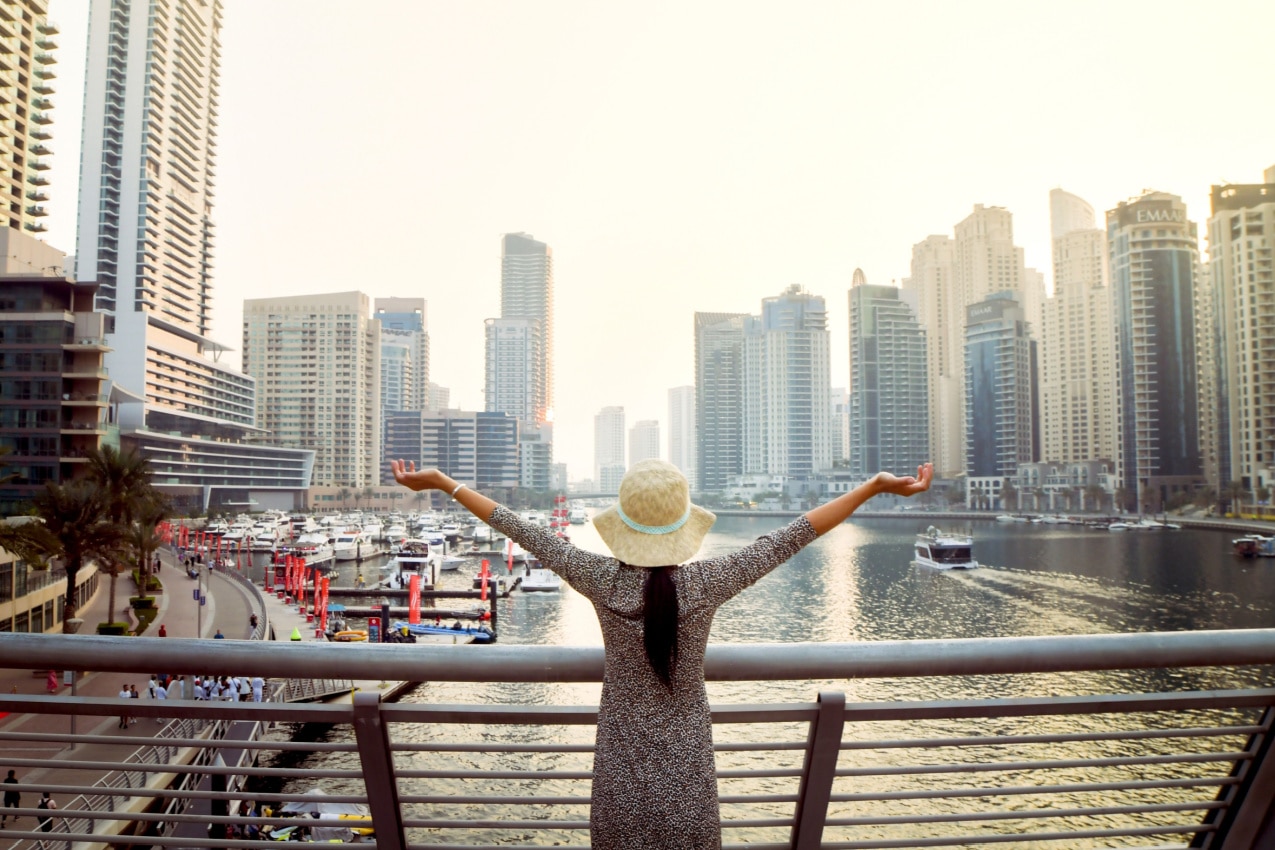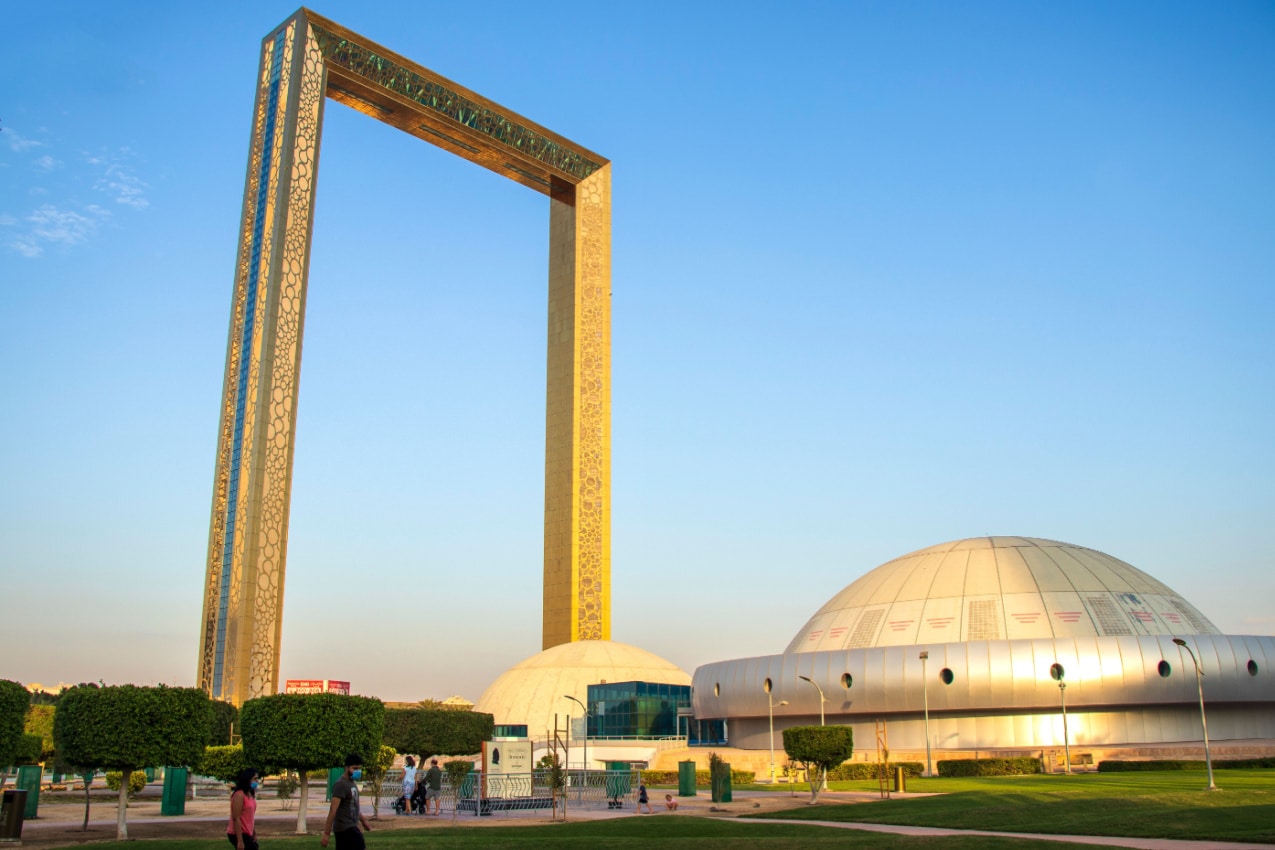Dubai, one of the seven emirates in the United Arab Emirates (UAE), has swiftly become a global hub for business, transport, and culture.
Despite its allure and wealth, some travelers may be uncertain about visiting Dubai. If you’re wondering, “Is Dubai safe?” The answer is: yes!
Dubai is a safe, diverse, developed, and bustling metropolis. However, beneath the shiny exterior, there are important considerations for visitors. Ready to explore them all? Let’s get started!
Are you planning a last minute trip to Dubai? We’ve put together all the resources you’ll need for a fun & safe travel:
🛌 Best & Safest Places to Stay in Dubai:
👉 The St. Regis Downtown Dubai – City view, Daily housekeeping, Free Parking
👉 The Dubai EDITION – Key card access, 2 restaurants, Fitness centre
👉 Jumeirah Creekside Hotel – Pets allowed, Free WiFi, Pool 1 – outdoor
👉 Palazzo Versace Dubai – Fitness centre, 3 swimming pools, Airport shuttle
⛱️ Fun Activities & Tours in Dubai:
👉 Dubai: Red Dunes ATV, Camels, Stargazing & 5* BBQ at Al Khayma Camp
👉 Dubai Marina Yacht Tour with Breakfast or BBQ
👉 1H JET SKI Tour Dubai, Burj al Arab & Atlantis
🚗 Best & Safest Dubai Transportation Services:
👉 Airport Pickup Service – Welcome Pickups
👉 Rent a Car – DiscoverCars
🙏 Stay Safe While Travelling:
👉 Safetywing (for medical insurance)
👉 VisitorsCoverage (for trip insurance)
Is Dubai Safe?

Dubai is safe for tourists, earning the 35th spot in the Global Safety Index by the Economist.
A closer look at the index reveals Dubai’s impressive positioning:
- 24th for digital security, surpassing cities like Rome, Milan, and Mexico City
- 13th in health security, outperforming Amsterdam, Washington DC, and Paris
- 32nd for infrastructure security, notably safer than Moscow and Istanbul
- 25th for personal security, surpassing cities such as New York, Los Angeles, and Chicago
Yes, there may be concerns about tensions in the Middle East, but the United Arab Emirates, including Dubai, have not been affected.
Here’s everything you need to know safety-wise:
- International travel warnings: “Level Two” safety, exercise “Increased Caution”
- Crime rating: Very low, 12.32
- Most common crimes: Theft and drug-related offenses
- Dangerous areas: Sonapur and Deira
- Safety walking alone during the day: Very High
- Safety walking alone at night: Very High
- Public transportation safety: Very safe and punctual
- Taxi safety: Safe, reliable, and metered
- Beach safety: Very safe, lifeguards are present, and multi-colored flags indicate the level of safety on each beach
- Natural disasters: Possibility of earthquakes, heavy rains, floods, sandstorms, and fog
- Carbon monoxide: Present, but preventable with a CO detector
- Tap water: Safe to drink
- Police presence: High presence, very professional and approachable
- Medical care quality: Very good, but expensive without proper travel insurance
Travel Advisory for Dubai
The United States, Canada, United Kingdom, and New Zealand travel advisories all place the United Arab Emirates under the “Level Two” safety category for travel, urging tourists to practice “Increased Caution.”
The warning is mainly due to the threat of terrorism and armed conflict in the area, particularly from militant groups operating in Yemen. International travel advisories emphasize the importance of remaining vigilant in public spaces, at events and staying informed about the ongoing situation.
A Comprehensive Look at Dubai Crime Rates
The crime rate in Dubai is very low, standing at only 16.32. To put it in perspective, Switzerland, considered one of the safest countries globally, has a crime index of 25.11, and Japan, another safe haven, has a crime rate of 22.88. However, this rating comes from individual contributors rather than official statistics, so take it with a grain of salt.
According to the Dubai police, theft is the most common criminal offense in Dubai, with an occurrence rate of 9.9 incidents per 100,000 people. Following closely are drug-related offenses, accounting for 8.4 incidents per 100,000 people.
The most crime-concentrated areas in Dubai are Sonapur, a neighborhood primarily inhabited by migrant workers, and Deira, the oldest and poorest district in Dubai.
Overall, the crime rate in Dubai is exceptionally low. While there’s still a minimal risk of petty offenses like theft or pickpocketing, the chances of encountering such incidents are extremely low.
| Safety Concerns | Crime Rate | Status |
| Overall Crime Level | 12.37 | Very Low |
| Increase in Crime (Past 3 Years) | 41.50 | Moderate |
| Home Break-Ins and Thefts | 14.44 | Very Low |
| Mugging and Robbery | 12.98 | Very Low |
| Car Theft | 10.54 | Very Low |
| Theft from Vehicles | 15.76 | Very Low |
| Personal Attacks | 15.04 | Very Low |
| Verbal Insults | 18.58 | Very Low |
| Racial, Ethnic, Gender, or Religious-Based Attacks | 14.13 | Very Low |
| Drug Use and Dealing | 18.34 | Very Low |
| Property Crimes (Vandalism and Theft) | 16.52 | Very Low |
| Violent Crimes (Assault and Armed Robbery) | 12.15 | Very Low |
| Corruption and Bribery | 24.51 | Low |
| Safety Walking Alone in Daylight | 91.15 | Very High |
| Safety Walking Alone at Nighttime | 83.05 | Very High |
Police Presence in Dubai
Dubai’s reputation as one of the safest cities in the world is a testament to the efficiency and professionalism of the Dubai Police Force.
The Dubai Police Force boasts over 17,500 sworn members and a force of more than 15,000 highly-trained and multi-skilled employees. It stands out for its technological advancements, being among the first police forces to adopt DNA testing, electronic fingerprinting, and paperless reports in criminal investigations.
Citizens can report minor car accidents through their app and provide self-service Smart Police Stations (SPS) for tasks like filing labor complaints or paying traffic fines, available 24/7. You may be surprised that the police here drive supercars—Ferrari, Lamborghini, and Chevrolet Camaro.
Entering a police station in Dubai can even be a welcoming experience, with some travelers reporting being offered tea and dates. All in all, if you are a respectful and law-abiding tourist, you will have no problems with the Dubai Police.
Public Transportation Safety in Dubai

Public transportation in Dubai is regarded as very safe. It has earned a spot in the top 60 cities with the best public transport, ranking 29th.
Stations and trains all have security personnel, cameras, and emergency alarms. Dubai even has air-conditioned shelters at bus stops, ensuring comfort while waiting under the hot sun.
To use public transport, you’ll need a Nol Card, which replaces a regular ticket for all Dubai public transport. Buses and metros don’t accept cash, so you’ll definitely need the card to use them.
The Dubai Metro features signage in both Arabic and English. Notably, it’s a driverless system—the first of its kind in the world. Metro stations have designated areas for women, the elderly, and the disabled. Plus, there are separate cabins for Gold Nol cardholders with better seats and more space. Men should be cautious not to enter the female-only sections to avoid fines. Eating, drinking, and chewing gum are prohibited on the metro, contributing to a clean environment.
Taxis in Dubai are well-maintained, air-conditioned, safe, and metered. The official taxi of Dubai is DubaiTaxi, and you can contact them by downloading their app or calling them at 800 88088. If you are a female traveler, Dubai also has pink cabs made specifically for women—offering an extra layer of safety while driving around town. Uber is also a reliable option. Overall, Dubai’s transportation system ensures both safety and convenience for travelers.
Medical Care Quality in Dubai
The Medical Tourism Index ranks Dubai among the top five destinations in terms of quality facilities and services. Whether you’re in Dubai for a medical procedure or seeking a doctor’s check for minor health-related issues, you can expect a luxurious and personalized medical experience.
Patient safety is of paramount importance in Dubai’s healthcare system. Private rooms, concierge services, and a variety of amenities are available in Dubai hospitals to ensure a high degree of patient care.
Some internationally accredited hospitals in Dubai are:
Healthcare in Dubai is provided free of charge for Emirati Citizens. However, for foreigners, private healthcare can be expensive. That’s why purchasing travel insurance can really ease your medical expenses.
Here are some insurance options:
- Orient Insurance
- Allianz Care Insurance
- GIG Travel Insurance (AXA)
- Sukoon Travel Insurance (Oman)
- Adamjee Travel Insurance
- Emirates Travel Insurance
- RSA Travel Insurance
- Union Travel Insurance
- World Nomads Travel Insurance
Rest assured you’ll receive top-notch medical care in Dubai. When considering insurance options, look closely at the offers, specific coverages, prices, and customer reviews, and choose the insurance plan that best fits your needs.
Is It Safe to Travel Solo in Dubai?

With a bit of background knowledge and an understanding of local customs, Dubai can be a very secure and pleasant location for solo travelers!
Numbeo shows a very high safety score for walking alone during the day and night, which isn’t something we see often when it comes to other tourist hotspots. But no matter how safe the destination proves to be, you shouldn’t overlook practicing basic travel safety precautions—such as being cautious when walking around the streets, not leaving drinks unattended, and avoiding accepting drinks from strangers. For solo female travelers, it’s crucial to be mindful of cultural nuances. For instance, avoid direct eye contact with men to prevent their misinterpreting it as flirting.
To further ensure a smooth solo experience for women, dress modestly and cover your legs and upper arms—you’ll get a warmer welcome from Emirati people by showing respect for their way of life.
Perils of Nature: The Risk of Natural Disasters in Dubai
When it comes to natural calamities, the United Arab Emirates Government is upfront about the potential risks of earthquakes, tropical storms, sandstorms, and fog in Dubai. Let’s see whether any of these pose a serious threat to your vacation.
Earthquakes
The United Arab Emirates is situated on the eastern part of the Arabian Peninsula and experiences occasional tremors, but they are generally of low magnitude.
In 2023, Dubai experienced 8 earthquakes with a magnitude of 2 or higher, which is very low. The strongest earthquake recorded near Dubai had a magnitude of 6.15 on the Richter scale, though it occurred 52 years ago—a relief to know that catastrophic earthquakes haven’t happened in a long time.
But even if an earthquake does occur, most buildings in Dubai are constructed to withstand earthquakes up to 5.9 magnitude, while Dubai’s Burj Khalifa was designed to survive earthquakes up to 7.0 in magnitude!
In the unlikely event of a serious earthquake, follow the directions of local authorities. If alone, take cover by dropping to the ground, covering your neck and shoulders, and seeking shelter under a sturdy desk if available.
Heavy Rains & Floods
Dubai has a desert climate with high temperatures and minimal rainfall. However, occasional storms can bring heavy rainfall, leading to potential city flooding.
The winter season (November to February) is more prone to rain and storms. For instance, on November 18, 2023, a storm hit Dubai, flooding streets and prompting authorities to advise people to stay indoors until conditions improved.
The good news is that heavy rain in Dubai is sudden and short. Even if flooding occurs, it won’t last long, and the city will return to normal quickly.
If excessive rainfall makes a surprise appearance on your Dubai holiday, keep in mind that road conditions may not be ideal for driving, flights might get delayed, and beach outings could be affected. Stick to indoor activities until the rain passes, and you’ll be back to enjoying your time in Dubai soon enough.
Sandstorms
Dubai is nestled in a desert, so it’s only natural to experience sandstorms from time to time. Dubai sandstorms usually appear in spring or summer and may last from a few hours to a full day.
The most recent sandstorm unfolded in March 2023, and the one before that in May 2022. Sandstorms can reach very fierce levels, envelop the whole city, impact visibility on roads and flights, and cause difficulties breathing.
In the event of a sandstorm, make sure to wear sunglasses so your eyes are shielded from the sand. Put on a scarf or mask to cover the nose and mouth and ease your breathing. Remain indoors until the conditions improve.
Fog
In Dubai, fog becomes more common during winter, as temperatures drop and cooler air condenses into tiny water droplets, making Dubai look like a futuristic city in the clouds.
The densest fog occurs during the early morning and late evening hours, significantly reducing visibility and, at times, causing flight delays or disruptions in transportation.
To navigate through foggy conditions, stay updated on weather forecasts and plan your activities accordingly. Patience is key! If outdoor plans are affected by fog, consider adapting your itinerary to include indoor attractions or activities.
Beware the Silent Threat: Carbon Monoxide Poisoning in Dubai
Two women in Dubai lost their lives due to carbon monoxide emitted by a charcoal burner—marking the sixth recorded incident of carbon monoxide poisoning in 2023.
But what exactly is carbon monoxide, and why is it so deadly? Carbon monoxide (CO) is a colorless and odorless gas produced when fuels like gas, oil, and coal do not burn completely.
Carbon monoxide prevents the blood from carrying oxygen to the body, eventually leading to paralysis, brain damage, and loss of life. Early symptoms of carbon monoxide poisoning include headaches, dizziness, nausea, chest discomfort, and loss of consciousness.
Dubai Police have issued a warning about the grave dangers of carbon monoxide poisoning. While many hotels and residents in Dubai have installed carbon monoxide detectors, it is advisable to purchase a portable CO detector for an additional layer of safety. If there’s a CO leak in your room, the detector will instantly alert you.
In the event of suspected CO poisoning, the immediate first aid steps are to get the affected person into fresh air and promptly call 998 for an emergency medical ambulance.
Serenity by the Shore: The Safety of Dubai Beaches
The sea is a major attraction in Dubai, and its glistening waters are generally very safe.
Dubai’s beaches have clearly designated areas for swimming, with trained lifeguards stationed at dedicated towers or patrolling the length of the beach.
Dubai Municipality uses warning flags on the beaches to signal the safety conditions for swimming:
- Red: High Hazard, do not swim
- Yellow: Moderate hazard, swim with caution
- Purple: Potentially harmful marine life
- Blue: Eco-friendly, clean, and bacteria-free waters
The best beaches in Dubai dedicated to swimming include:
- Jumeirah 1 Beach
- Jumeirah 2 Beach
- Jumeirah 3 Beach
- Umm Suqeim 1 Beach
- Umm Suqeim 2 Beach
- Al Mamzar Corniche Beach
- Al Mamzar Lagoon Beach
Overall, you can expect a safe and positive experience on Dubai’s beaches. Follow the warning flags, keep a close eye on your children in and around the water, and contribute to the beach’s cleanliness by not leaving any garbage behind.
Dubai Weather Patterns: What to Expect

In Dubai, the climate is characterized by long, sweltering summers and comfortable, dry, and mostly clear winters. Throughout the year, temperatures typically vary, reaching as high as 112°F (44.44°C) and rarely dropping below 52°F (11.11°C).
The hot season spans May to September, with an average daily high temperature surpassing 100°F (37.78°C). August stands out as the hottest month, with an average high of 106°F (41.11°C).
On the other hand, the cool season extends from December to March, featuring average daily high temperatures below 81°F (27.22°C). January is the coldest month, with an average low of 58°F (14.44°C).
The rainy period lasts from January to March, with February being the month with the most rain in Dubai, averaging 0.6 inches (15.24 mm). Conversely, the dry period spans April to January, with August experiencing the least rainfall, averaging 0.0 inches (0.0 mm).
Monthly Average Temperatures in Dubai
| Month | Fahrenheit (°F) | Celsius (°C) |
| January | 66 | 18.8 |
| February | 68 | 20 |
| March | 73 | 22.7 |
| April | 81 | 27.2 |
| May | 88 | 31.1 |
| June | 91 | 32.7 |
| July | 95 | 35 |
| August | 95 | 35 |
| September | 91 | 32.7 |
| October | 84 | 28.8 |
| November | 77 | 25 |
| December | 69 | 20.5 |
When Is the Best Time to Visit Dubai?
The best time to visit Dubai is any time between November to February.
Late fall and winter boast the best weather—a pleasant escape from the scorching heat that characterizes the rest of the year. You can stroll on the beach, marvel at the futuristic skylines, and immerse yourself in the beauty of the desert’s rolling dunes. It’s the sweet spot where you can explore the city’s diverse topography without the risk of a heatstroke!
However, keep in mind that this is peak tourist season, so get ready for higher accommodation costs and larger crowds at major attractions. The vibrant energy and pleasant weather make it all worthwhile but keep these considerations in mind.
If you prefer avoiding crowds, the best time to visit Dubai is from April to October. During these months, which include the shoulder and low seasons, many residents leave, and tourist numbers are lower. The summer months of June, July, and August, in particular, are the quietest as people escape the heat. This period not only offers a more serene experience but also brings the best deals on hotels and flight tickets. It’s an excellent time to explore indoor attractions and secure bookings at popular restaurants or beach clubs.
All in all, Dubai is beautiful year-round, it’s just a matter of your personal preference that sets one season as better than the other.
How to Stay Safe in Dubai
- Respect Ramadan: During Ramadan, it’s crucial to show respect by refraining from public feasting. Save eating and drinking for private spaces or designated restaurants
- Zero tolerance for illegal substances: Drug consumption in Dubai is illegal – even minimal traces in your bloodstream count as “possession”
- Watch your content: Leave the adult content at home, as importing anything perceived as pornography is a legal no-go
- Sip smart: Enjoy your alcoholic beverages in licensed venues and in moderation. Public intoxication is illegal in Dubai
- Mind your manners: Public drunkenness, swearing, or obscene gestures might land you in trouble with the police
- Be cautious with that camera: No snaps of government buildings, military zones, or unsuspecting individuals
- Get a Dubai SIM: Stay connected with a Dubai SIM card
- Love in private: Public displays of affection might lead you to problems with the authorities; keep the romance confined to private spaces
- LGBTQ+ alert: The UAE does not accept the LGBTQ+ community. Be cautious, as non-heterosexual relations are criminalized
- Guard your goods: Pickpocketing is more common near ATMs, bus stations, beaches, malls, and clubs
- Desert adventure tips: Go with reputable safari groups, pack extra water, hydration tablets, food, and sun protection
- Taxi etiquette: In a taxi, opt for the back seat, and be mindful that small talk might be misunderstood
Emergency Numbers
- Emergencies: 999
- Police Call Center: 901
- Ambulance: 998
- Fire Department: 997
FAQ
Dubai’s tap water meets the stringent criteria set by the World Health Organization (WHO). In essence, it’s totally safe to drink water in Dubai straight from the tap.
However, it’s important to consider the condition of water storage tanks. If not properly maintained, they could potentially affect the safety of tap water.
For those with a sensitive stomach, bottled water remains a popular choice. Some even choose to boil their tap water, just to make sure it’s free of impurities.
Yes, credit card fraud can occur in Dubai. The Canadian travel advisory recommends that tourists pay careful attention when others handle their cards. It’s advisable to use ATMs in well-lit public areas or inside banks or businesses with security. Be cautious of card readers with irregular features. When entering your PIN, cover the keypad, and regularly check your account statements for any unauthorized transactions.
Yes, cybercrime may happen in Dubai. Be cautious with public Wi-Fi, as cybercriminals might sneak into unsecured networks and steal your sensitive info. It would be in your best interest to avoid public Wi-Fi and shop only on encrypted websites.
Telephone scams are rare, but they do happen in Dubai. Scammers sometimes pose as local authorities or banks, seeking personal info or fund transfers to resolve fake issues. So if someone’s asking for money or your personal details, kindly refuse their request.
Dubai roads are in excellent condition, but be cautious during sandstorms or foggy weather. If you’re driving, make sure you don’t have alcohol in your system. Maintain a safe distance on the road, use GPS for navigation, and always heed the road signs. For off-road adventures, stick to a 4×4 convoy. Be prepared with essentials like a cell phone, ample gasoline, water, sunscreen, and snacks for the journey.
Dubai Is Safe, So Pack Your Bags!
Dubai stands out in the Middle East as a top-notch destination, and when it comes to safety, it’s got its game on point.
Yes, there’s chatter about potential risks like terrorism, but Dubai maintains a solid track record for safety. The crime scene here is low-key, usually involving minor incidents like unauthorized drug adventures or sneaky theft.
For members of the LGBTQ community, it’s important to exercise caution and keep a low profile while in Dubai, as non-heterosexual relations are considered illegal.
The Dubai Police are your trustworthy guardians – professional, approachable, and ready to assist if you need navigation through the city’s urban landscape.
And the weather? Dubai’s climate is consistently warm, especially in summer. So, sunscreen up, stay hydrated and maybe take a breather indoors during the peak heat hours.
Safe travels!
Good point on the safety of tap water. Another thing I’d add is that most of the water supply comes form desalination plants, so you’d be probably missing out on the minerals you’d get form the ground water.
A small personal story, it was Dubai as the only country where I got seriously ill in over a decade of travel. One of the reasons my doctor told me might have been the contamination water storage tanks in the building I was staying at the time.
And to add my personal $0.02 to the article – yes, UAE is 100% safe. Especially if you stay in the more touristy/expat areas. The only thing that’s unsafe is the extreme heat during summer month haha
The depth of analysis and practical tips provided here is commendable. Thanks for sharing this valuable information!